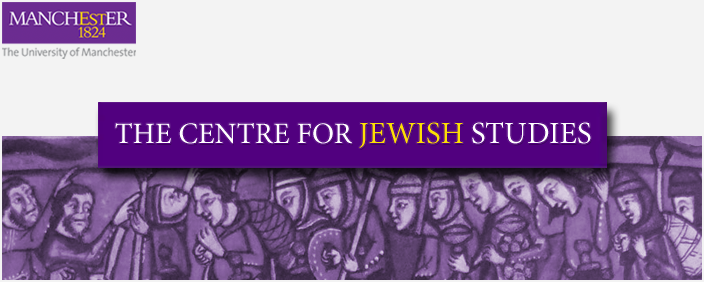Sherman Lectures 2011: 'Toleration within Judaism'
 Wednesday, May 4, 2011 at 9:52AM
Wednesday, May 4, 2011 at 9:52AM  The Centre for Jewish Studies would like to invite you to this year’s Sherman Lectures, Mon 16 - Thurs 19 May 2011, 5.15pm, featuring Martin Goodman of the University of Oxford. The daily venue is Room A101 in the Samuel Alexander Building, University of Manchester (Building 67 on Campus Map). All are welcome to attend, and all events are free of charge. If you would like to help publicise this event, please download the poster.
The Centre for Jewish Studies would like to invite you to this year’s Sherman Lectures, Mon 16 - Thurs 19 May 2011, 5.15pm, featuring Martin Goodman of the University of Oxford. The daily venue is Room A101 in the Samuel Alexander Building, University of Manchester (Building 67 on Campus Map). All are welcome to attend, and all events are free of charge. If you would like to help publicise this event, please download the poster.
Series Abstract: Varied forms of Judaism have coexisted throughout most of Jewish history. Religious differences have sometimes led to conflict, but at other times Jews have tolerated different practices and beliefs within their communities. The lectures seek to trace and explain some cases of toleration within Judaism from the period of the Second Temple to the present.
1. Monday 16 May: ‘The Study of Toleration within Judaism’ (Also the Sherman Community Lecture, in conjunction with the Jewish Representative Council and ZCC). Followed by CJS kosher reception.
The lecture will investigate when and why Jews have tolerated within their communities religious practices and beliefs to which they object, examining what we mean by ‘toleration’ and how Jews have expressed notions of toleration in different periods. The lecture will propose procedures for discovering cases of toleration in practice despite the concentration of so much of the surviving evidence on conflict and division within Judaism.
2. Tuesday 17 May: ‘Toleration in late Second Temple Judaism: Sadducees, Pharisees and others’
Jews in the first century CE interpreted the Torah in varied fashions, resulting in disparate lifestyles and theologies, but almost all of them shared allegiance to a single Temple which was administered by a hierarchy appointed from within a hereditary caste of priests. The lecture will examine how these Jews accommodated themselves to the inevitability that the Temple was run by the priests in a way that must always have seemed to one group of Jews or another to be an infringement of the requirements of the Torah as they interpreted it.
3. Wednesday 18 May: ‘The Houses of Hillel and Shammai in rabbinic tradition’
The Mishnah refers to a series of halakhic disputes between the House of Hillel and the House of Shammai. The lecture will investigate why these disputes were recorded and how the attitude of the editor of the Mishnah to these disagreements differed from that attested in other rabbinic traditions.
4. Thursday 19 May: ‘Reasons for toleration within Judaism (from antiquity to now)’
The lecture will investigate why differences in theology and practice sometimes lead to conflict and sometimes seem unimportant, examining different explanations for toleration in specific case studies in the history of Judaism from the Second Temple period to now.
Masterclass
There will be a Masterclass for Postgraduate Students on Research Methods with Prof. Goodman on Thursday 19 May at 10:00am in Room A116 of the Samuel Alexander Building. The Masterclass will be chaired by Prof. Philip Alexander. Any postgraduate students who wish to attend are welcome to email cjs@manchester.ac.uk, in order to allow us to know how many plan on joining the session. All are welcome.
Martin Goodman is Professor of Jewish Studies and Fellow of Wolfson College, University of Oxford. His research interests are primarily in the political, social and religious history of the Jews in the Roman empire. He has focussed in particular on the relationship of the Jews to the wider Roman world in which they lived. Publications




Reader Comments